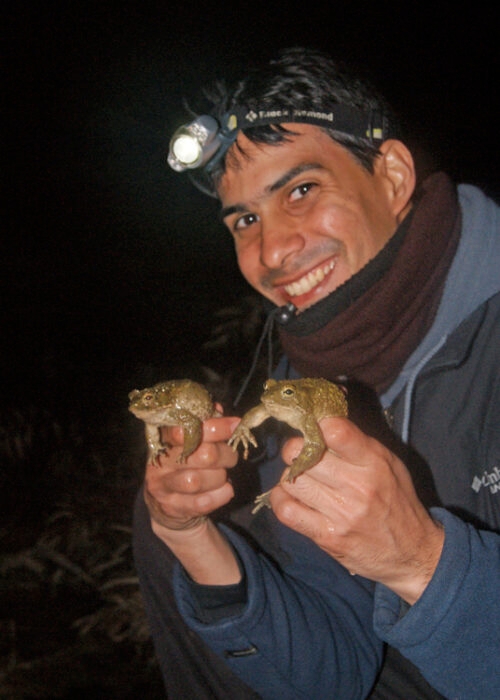Dr. Daniel Medina
PHD FELLOW GRADUATE | Global Change Center
VT Graduate July 2018, Biological Sciences
Advisor: Dr. Lisa Belden
Google Scholar • daniel84@vt.edu

Daniel defended in July of 2018. Post-graduation he worked as a Postdoctoral Fellow for the Amphibian Natural History Laboratory of the University of Campinas, Brazil. Daniel currently works for the School of Field Studies as a Resident Lecturer in Tropical Forest Ecology and Resource Management.
Daniel joined the Belden lab in the fall of 2013 as a PhD student in community and disease ecology, and successfully completed his degree in the summer of 2018. He grew up in Panama, where constant access to the outdoors woke in him a strong interest and curiosity about the natural world. Daniel’s interest in research and conservation continued to grow during his undergraduate experiences at the Universidad de Panamá; his Master’s work at the Universidad Complutense de Madrid, Spain; and as a result of several internships at the Smithsonian Tropical Research Institute in Panama. Throughout his academic and professional development he has participated in diverse projects related to amphibian systematics, community ecology, host-pathogen interactions, and conservation.
Daniel has a broad interest in all threats to biodiversity and global health. However, habitat loss, the introduction of non-native species, and disease concern him the most. Experiencing first-hand the massive loss of amphibian diversity in much of the highlands of Panama due to chytridiomycosis has greatly influenced the direction his research interests have taken.
Daniel’s undergraduate thesis project focused on Neotropical amphibian systematics, ecology, and phylogenetics. Specifically, he investigated patterns of amphibian species richness along an elevational transect. As part of this work, he identified four new amphibian species that occur in Panama. However, for his Master’s thesis, his focus switched to understanding host-pathogen dynamics in a population of salamanders (Salamandra salamandra) infected by a pathogenic fungus (Batrachochytrium dendrobatidis or Bd) in central Spain. His research showed that both life history stage and type of breeding habitat have important implications for the spread and ultimate size of epidemics. Prior to starting his Master’s, he helped establish and run a new amphibian captive breeding program in Panama. Most recently, Daniel has worked on a project investigating the functional and taxonomic diversity of the amphibian skin microbiota and its interactions with Bd infections. He is currently studying the ecological factors influencing the community composition of amphibian skin microbiota, and the microbes’ potential role as a defense mechanism against pathogen infection.
In addition to amphibian research, Daniel is interested in working with indigenous groups on sustainability issues. In 2012 and early 2013 he participated in the creation of a sustainable forestry program for the Emberá-Wounnan, an indigenous group in Panama. He considered this experience very rewarding, and that has also taught him that successful ecological studies need to combine not only rigorous science but also social and humanitarian issues.
Last updated May 2024.


